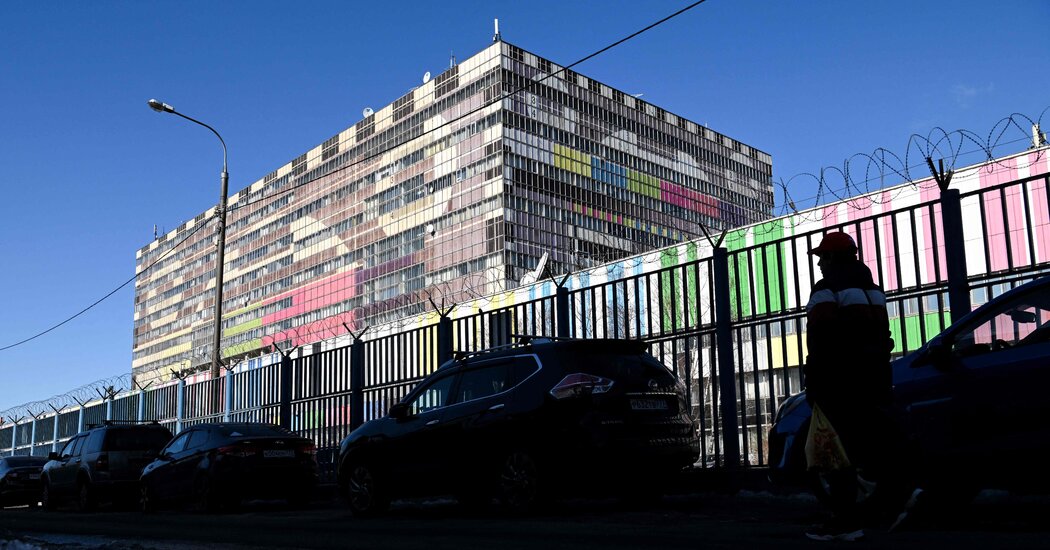
Dmitri Likin spent more than two decades helping shape the look of Russian state television, but he says neither he nor his friends ever watched the news.
It is an illustration of the kind of bargain long made by some employees of the Kremlin propaganda machine — people who valued the steady work and the creative challenge, even if they did not agree with the mission of their workplace.
It was only this month, after President Vladimir V. Putin invaded Ukraine, that Mr. Likin resigned as the longtime art director for Channel 1, the Russian state television network that is a major player in the Kremlin’s sprawling propaganda apparatus. He insisted that he was “not a politician,” but that the invasion meant he was now part of an operation with a “life-exterminating” agenda.
“In Russia, television is made for people who for one reason or another are too lazy to use alternative sources of information,” Mr. Likin said in a phone interview, reflecting on his audience. “These are simply people who lack education, or who lack the habit of analysis.”
Mr. Putin’s invasion of Ukraine has led some Russians who long worked for the government to cut ties with it, a sign of how the Kremlin is struggling to keep society fully unified behind the war. Thousands have been arrested protesting the invasion of Ukraine, tens of thousands have fled the country, and on Wednesday, Mr. Putin’s climate envoy, Anatoly Chubais, became the first senior government official reported to have quit since the invasion began on Feb. 24.
There have been at least four high-profile resignations at Russia’s state television channels, a crucial pillar of Mr. Putin’s dominance over the country’s domestic politics. Marina Ovsyannikova, the Channel 1 staff member who interrupted a live news broadcast last week to unfurl an antiwar poster that said, “They’re lying to you here,” offered the most striking act of protest. Others, like Mr. Likin, have gone more quietly, providing a glimpse of the ferment inside Mr. Putin’s system — and a reminder of the immense power of television in shaping how most Russians see the war.
“People are just depressed — clinically depressed,” Zhanna Agalakova, a Channel 1 correspondent who resigned this month, said of some of her colleagues left behind. “Many thinking people are sensing their own guilt. And there is no exit, you understand? Simply asking for forgiveness is not enough.”
All of Russia’s national television networks are controlled by the Kremlin, and while their influence has declined with the rise of YouTube and social media, they remain the public’s single main source of news. About two-thirds of Russians relied on state television last year to get their news, down from 90 percent in 2014, according to surveys by the Levada Center, an independent Moscow pollster.
During the war, the state television channels have delivered to Russians a picture of the conflict that is the polar opposite of what people see in the West: The Russians are the good guys, as they were when fighting Nazi Germany in World War II, bringing liberation to Ukrainian lands seized by neo-Nazis funded by the hegemonic West. Pictures of dead civilians and destroyed homes are falsely branded either fake or the consequence of the Ukrainians shelling themselves.
“Local residents are saying that the Ukrainian military is deliberately shooting at residential buildings,” a Channel 1 reporter said in a segment broadcast on Wednesday from the Ukrainian city of Mariupol, the target of some of the fiercest Russian bombardment of the war. “Others are saying the nationalists were ordered to destroy the city as much as possible before retreating.”
Most Russians, pollsters say, buy into the message beamed into their living rooms — especially since the war is being presented as a logical extension to the narrative of enmity and grievance toward the West that Russian television has been promoting for years. And most state television journalists have, for now, stayed in their jobs, amping up to a fever pitch the message of Russia struggling for its right to exist. Liliya Gildeyeva, an anchor who quit the state-run channel NTV, told the Russian outlet The Insider this week that she could not judge her colleagues who had stayed behind — and acknowledged that she herself had made compromise after compromise, realizing only when the war started how far she had gone.
“When you gradually give in to yourself, you do not notice the depth of the fall,” she said.
The shock of the war appears to be what pushed tens of thousands of Russians into a historic exodus in recent weeks, packing planes to destinations that were still accepting flights from Russia, like Turkey and Armenia. While some were journalists and activists fleeing possible arrest, many others were tech workers and other young professionals who suddenly no longer saw a future for themselves in Russia.
Some members of Russia’s elite, too, have headed for the exits. News of the most high-profile departure so far came on Wednesday when Bloomberg News reported that Mr. Chubais, the Kremlin’s climate envoy, had quit over the war in Ukraine and left the country. The Kremlin confirmed that Mr. Chubais had stepped down. He was seen as one of the few liberal-minded officials remaining in Mr. Putin’s government, and his leading role in Moscow’s 1990s economic reforms made him unpopular in much of Russian society.
It is far from clear if the grumblings among some of the elite could in any way destabilize Mr. Putin’s government. Mr. Likin, the former Channel 1 art director, said he believed that people like him who were willing to resign over their principles made up a “tiny minority” of Russia’s populace.
Russia-Ukraine War: Key Developments
“A lot of people don’t work for an idea,” Ms. Agalakova, the former Channel 1 correspondent, said of her ex-colleagues who stayed behind. “People have a family, have loans and have some kind of need to survive.”
Those who quit state television jobs, and especially those who speak out, face an uncertain future. Ms. Agalakova spoke by phone from Paris, where she had been based as a correspondent, and said that some of her acquaintances stopped communicating with her after she quit. Mr. Likin said he planned to stay in Russia and continue his parallel career as an architect. He said he could imagine returning to television if it “changes its agenda from a life-exterminating one to a life-affirming one.”
Government-sponsored polls claim that most Russians support Mr. Putin’s invasion, though analysts caution that people are even less likely to answer surveys truthfully at a time of war. Years of propaganda on Russian television, Ms. Agalakova now recognizes, prepared the ground for war, in particular by subverting Russians’ remembrance of their country’s World War II sacrifice into support for the Kremlin’s current policies.
“Of course, when the concept of Nazism is thrown into society, as though it is literally in our backyard in Ukraine, everyone reacts instantly,” Ms. Agalakova said, referring to the Kremlin’s false claims that Russia is fighting Nazis in Ukraine. “This is a shameless game. This is a fraudulent game.”
Amid the propaganda barrage, Russians who distrust television have found ever fewer places to turn for more accurate news. Since the start of the war, the liberal Echo of Moscow radio station has been shut down, the TV Rain independent television channel has gone off the air for the security of its staff, and access to Facebook and Instagram has been blocked by the government.
On Tuesday, Russian authorities announced that a popular journalist, Aleksandr G. Nevzorov, was under criminal investigation for posting about the Russian bombing of Mariupol on his Instagram page. It was the latest effort to sow fear among critics of the war by trumpeting the enforcement of a new law that hands out as many as 15 years in prison for any deviation from the official narrative about what the Kremlin calls a “special military operation” in Ukraine.
Denis Volkov, the director of the Levada polling center, says the real test for Russian public opinion is still to come as the economic hardships touched off by Western sanctions filter through society. Still, he said he thought that the Kremlin’s narrative of a West subverting Ukraine in order to destroy Russia, and of Russia’s waging a noble fight to protect its people abroad, has become so strongly ingrained in the television-viewing public that it was unlikely to be dislodged anytime soon.
“What seems to fit is accepted, what doesn’t fit is simply rejected,” Mr. Volkov said of how many Russians perceive the news to agree with the television narrative. “What is true or not true doesn’t matter.”



